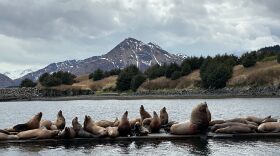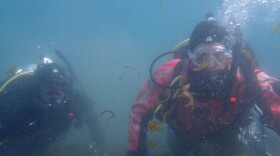The Tribe’s natural resources department is known for its marine mammal necropsies and entanglement response as well as managing invasive crayfish. But now they’re going to add Emperor geese and Aleutian terns to that list.
“Both of which are not technically threatened at this point, but they do have conservation concerns,” said Daniel Smith, a biologist for the Tribe.
The species used to be monitored and researched by state and federal biologists, but the person spearheading the efforts left Kodiak recently. That’s why the U.S. Department of Fish and Wildlife set aside up to $200,000 to pay the Tribe to monitor the geese and terns along the road system instead.
They’ll count birds and look for population trends like estimated average ages. The funding is supposed to last for at least two years, but the goal is to get more grants and do more long-term research.
Smith said the population of Emperor geese have declined for about 40 years until a slight uptick around the early 2000s. A sport and subsistence hunt was opened for the species starting in 2017.
“Unfortunately over the last eight, maybe five years there’s been a decline in this species, which probably means they weren’t ready to be harvested yet,” said Smith. “And so there is a statewide decline of these species, but something we’ve noticed here in Kodiak is an increase in Emperor geese.”
So the island is an outlier for these geese. It’s led to some interesting finds.
“One thing we’ve been seeing and what I’ve been hearing about is Kodiak has a very much larger juvenile population here, at least for Emperor geese here in Kodiak,” he said.
When it comes to Aleutian terns though, Smith said that species has been even less lucky in the last 60 years.
“I believe it was 2014 when they put this out – there was over a 90% decline in their statewide population of Aleutian terns, which we were seeing that as well in Kodiak,” he said.
Smith said he’s interested to research how vulnerable those birds are to human disturbances, like ATVs.
“That’s one thing that we want to do through this grant, is really just to educate the public about minimizing disturbances for this species,” he said.
Some of the most common areas species could be disturbed include around Middle and Women’s bays as well as near the Pasagshak State Recreation Area’s Lake Rose Tead.
Research could start as soon as this winter.





